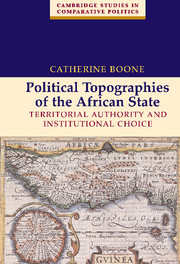Book contents
- Frontmatter
- Contents
- List of Maps, Tables, and Figures
- Preface and Acknowledgments
- 1 INTRODUCTION
- 2 MAPPING POLITICAL TOPOGRAPHY IN AFRICA
- 3 UNEVEN INSTITUTIONAL TOPOGRAPHY WITHIN ONE STATE
- 4 TAXING RICH PEASANTS: REGIME IDEOLOGY AS STRATEGY
- 5 THE GEOPOLITICS OF LATE DEVELOPMENT
- 6 CONCLUSION
- Appendix: A Note on Sources, Evidence, and Measurement
- References
- Index
- Cambridge Studies in Comparative Politics
2 - MAPPING POLITICAL TOPOGRAPHY IN AFRICA
Published online by Cambridge University Press: 26 December 2009
- Frontmatter
- Contents
- List of Maps, Tables, and Figures
- Preface and Acknowledgments
- 1 INTRODUCTION
- 2 MAPPING POLITICAL TOPOGRAPHY IN AFRICA
- 3 UNEVEN INSTITUTIONAL TOPOGRAPHY WITHIN ONE STATE
- 4 TAXING RICH PEASANTS: REGIME IDEOLOGY AS STRATEGY
- 5 THE GEOPOLITICS OF LATE DEVELOPMENT
- 6 CONCLUSION
- Appendix: A Note on Sources, Evidence, and Measurement
- References
- Index
- Cambridge Studies in Comparative Politics
Summary
It is necessary to appreciate, first, that there were extensive regional social organizational differences in early modern Europe, and second, that these regional differences influenced the course of the formation of modern state apparatuses. Yet these considerations have generally been ignored in the literature. The failure to take regional differences in social organization into account has led to an unwarranted emphasis on the exogenous determinants of initial state formation in Western-European history.
Hechter and Brustein 1980:1063Rural political landscapes vary widely, even across closely neighboring regions in West Africa. Some states have sought to build a local presence that intrudes in the most intimate workings of village life, and even to “rewire the circuits of local authority” (Dunn 1975:195). Others remain aloof. To repeat Goran Hyden's (1983) evocative phrase, they remain suspended balloon-like in mid-air. In some places, the state's administrative outposts are captured by local big men and chiefs, while elsewhere state officials posted in the localities are constrained only by the directives of their superiors in capital cities like Abidjan, Accra, or Dakar. There are variations in the intrusiveness of the state at the local level, in rulers' autonomy vis-à-vis local interests, and in the capacity of rural actors to harness state prerogatives and resources to serve their own purposes.
- Type
- Chapter
- Information
- Political Topographies of the African StateTerritorial Authority and Institutional Choice, pp. 11 - 42Publisher: Cambridge University PressPrint publication year: 2003

